|
||||
|
+ARE YOU NOIR OR HAVE YOU EVER BEEN?+ Angel Season 4 references up to 4.8 'Habeas Corpses' - you have been warned! It's not quite the case that Film Noir is to Angel what Horror is to Buffy, but Angel is in many ways based on the Film Noir, and its style, characters and even ideology stem from this as much as they do from its parent show. Film Noir isn't a genre, like Horror, but it's a style distinct enough from any old detective or crime film (or TV series) for it to be given its own name. Film Noir was about many of the things I've discussed in other articles while writing about Buffy; Film Noir is influenced by existentialism, and it shares many features with the gothic. Noir is about alienation from society as a whole, about a world of corruption and indistinct morality which exists parallel to the safe, ordinary world; like existential characters, Noir heroes (or more often anti-heroes) rarely fit in with marriage, conventional jobs, family or other things considered normal in society. Like gothic heroes, Noir characters are often threatened by a murky past or embroiled in doomed sexual relationships. THE
ANTI-HERO When the show was at its most Noir, in Season 1, Angel was a solitary figure, but like any Noir hero (you can add the 'anti-' yourself) he was also motivated to exist in society. While Angel doesn't feel involved with the city around him, he's compelled to be; for many Noir detectives, the motive was money or escape from themselves and the memories of their past. Angel doesn't want to escape from his past, rather he wants to be redeemed for it; good deeds, rather than dollars, are Angel's currency and his motivation. But while Angel is compelled be involved with people, he doesn't want to connect with Cordelia, Doyle or later Wesley; he's cynical about humanity, and indeed cynical about the prospect of his own redemption. Like many Noir heroes, he's disillusioned with his purpose, a knight errant on a probably unattainable quest. The idea of the Higher Powers isn't something Angel has respect for, but rather something which he fights against; he's even alienated from this metaphysical society. In 'The Trial', Angel succeeds in beating the system, but he exists outside of it; Noir heroes aren't part of society, they exist on its edges, dealing with whatever it tries to sweep to one side. Angel takes for granted his role on the outer perimeters of the human world, and the demon underworld that he deals with is an allegory for the underbelly where Noir detectives operate. Wesley
is the second significant Noir hero in the series; in Season
3 through 4, for different reasons Wesley is driven to reprise
Angel's role, and in some ways he becomes more typical of the
style. While Angel's morality always had an ultimate purpose
towards 'good', Wesley's motivation is less clear; he continues
the work of Angel Investigations, but it isn't clear whether
money, prestige, redemption or simply passing the time is his
reason. Wesley loses his sense that he can work for the side
of Good against Evil. Conventional Noirs have their hero alienated
from the morality and sensibilities of While the Noir sometimes featured female leads, Angel the series does break with the original mould through the character of Kate, a female character who is also a conventional Noir detective. While part of society, being with the LAPD rather than a lone private eye, Kate is equally outside of it and marginalized through her interests in the supernatural and the city's demonic underside. Her inability to accept the conventional view of 'vampires aren't real' acts as a parallel and metaphor of the Noir hero's inability to exist within the accepted black and white cops and robbers view. FEMME
FATALE VS. 'FEMME GENTIL'
Lilah Morgan represents much of what constitutes the femme fatale; manipulative, sexual, in control of her emotions, able to control men. While many female characters in the show or in Buffy have used physical force, Lilah's adherence to never using violence herself links her with Noir; she is able to exercise psychological control over others to achieve her aims. While not her only motive, she uses her seduction of Wesley to gain information, and to edge him towards her way of thinking. Lilah doesn't believe in the moral absolutes that are alien to the Noir:
Darla is also, for much of the series, a typical femme fatale. She is able to manipulate Lindsey, a member of Wolfram & Hart but also an ambiguous Noir anti-hero, and she is able to exercise sexual power of Angel. But while Darla begins as the femme fatale, the deadly seductress, her role changes through Season 2 and she becomes the second main Noir archetype, the nurturing woman or rejuvenating redeemer. In Noir, this woman is in many ways the opposite of the femme fatale. Instead of being trapped by society or family, the woman represents the favourable aspects it. But significantly, she is unattainable to the hero, who is unable to fit in with marriage or family, and is brought to ruin by (or more accurately with) the femme fatale. In Angel, society is often symbolised by morality and the fight of good an evil; being able to embrace good, as opposed to grey, is the goal of many characters, just as many traditional Noir heroes tried to embrace marriage or family: this proves unattainable. Darla does achieve redemption herself, and Angel can be seen as a male version of the nurturing archetype, enabling Darla to symbolically embrace good, and also more conventionally to embrace family. Darla's death, however, puts a Noirish seal on events, there being no true happy endings.
For Wesley, Fred is the nurturing redeemer to Lilah's femme fatale. She represents the side of Good, and metaphorically and literally the ideals of romance, relationships, family. For Wesley, his actions are what he feels has separated him from her; in acting alone, and in apparently straying from his 'Good' morality, Wesley finds Fred to be unattainable. Gunn is not a Noir hero; he has moral certainties, and Wesley feels that Fred has chosen Gunn because of this. Gunn and Fred are both symbols of a potentially rejuvenating or redeeming figure, but Wesley finds their love and friendship unreachable. For Angel's Noir heroes, to be morally black and white is both impossible and desirable; while in Buffy moral certainties are apparently easy to find but a grey moral outlook is harder, in the City moral ambiguity is everywhere, and Wesley find it difficult to fight only for 'Good' and to avoid aiding Evil. The unattainability of a Good/Evil morality is a metaphor for the unattainability of a place in society, in this sense. Cordelia is a hero of the story as much as Angel or Wesley, but she also represents the unattainable nurturing redeemer for Angel. Angel's curse is a block of society, something external to himself, and in this way it works as a metaphor for the Noir hero's sense of there being a wall between himself and the conventional life and family. Cordy is unreachable for Angel because of this, but also because of her apparent inability to reconcile herself with his past deeds; as with Wesley and Fred, it seems that morality is a barrier. A
TOUCH OF EVIL In a similar way to Buffy's 'Reptile Boy', 'Guise Will be Guise' portrayed corruption at the heart of the financial sector, with a wealthy man's fortune based on human sacrifice (of his daughter) and evil rituals. This hidden dark occult is used as a metaphor for literal crookedness and cannibalistic ruthlessness in the business sector. The episode 'The Thin Dead Line' was about corruption and brutality in the police force, with the actions of a Chief of Police in command (sitting back at a safe distance to direct 'zero tolerance' methods) represented by dabbling with the occult, using dead police officers to work the beat. Institutions of law are shown as unreliable, being either blind to the truth or capitalising on the possibilities of dark powers for their own ends; low crime statistics are put over people's wellbeing.
Moral ambiguity, while something the heroes struggle with, isn't part of the corruption; the more evil side of grey is. But 'That Old Gang of Mine' points to the equal corruption of a supposedly 'good' morality, a morality which isn't ambiguous. Gunn's old gang have a new leader who doesn't make the distinctions that Gunn has learnt to make between good and evil and the many degrees in between, and who kills demons regardless of their own morality and regardless of other established institutions and rules, such as those in Caritas. By not making any distinctions and by sticking to one ideology, Gunn's old gang tip towards evil. NO
NOIR NO FUN Angel, Cordy and Wesley all have a reason for fighting which separates them from many conventional Noir heroes. While it's common for a Film Noir hero to begin with moral certainties but have them stripped away, the idea of the 'good fight' is central to Angel Investigations, whereas usually money or sex were the only motivations for a Noir detective. Similarly the concept of family is not entirely something unattainable at all; Angel Investigations is a family. When it does break up, as when Angel fires the staff in Season 2, the show becomes more Noirish; yet the prevalent feeling is more positive. Like Buffy, Angel exists within a certain framework, in this case the morally ambiguous and dangerous world of the Noir. But, again like Buffy, Angel frequently steps outside this framework, and frequently stretches and challenges its conventions. Much of the drama, in fact, comes from the conflict between the Noirish city and a small group of idealists who themselves can exist both inside and outside of the conventions, with Angel being the chief example of this; a character who, only in his darkest and most uncertain moments, is pure Noir.
+LINKS+ Screencap credit goes to Buffyworld
|
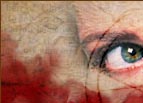
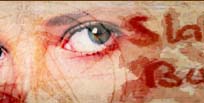
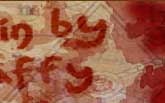
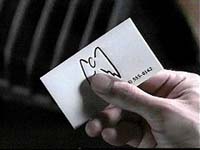
 society;
while Angel's alienation is self-imposed, Wesley feels that
society (or more specifically Angel Investigations) is responsible.
We know he feels that he's acted rightly; we don't know whether
he feels he can do so again.
society;
while Angel's alienation is self-imposed, Wesley feels that
society (or more specifically Angel Investigations) is responsible.
We know he feels that he's acted rightly; we don't know whether
he feels he can do so again.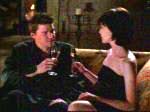
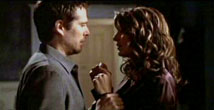 Wesley:
There is a line, Lilah. Black and white. Good and evil.
Wesley:
There is a line, Lilah. Black and white. Good and evil.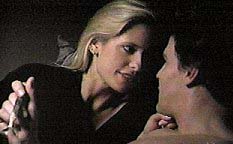 In
Season 1, Buffy represents the nurturing woman for Angel; she
allows him the possibility finding the things he had been denied,
things most Noir heroes are denied: love, family, moral security.
For Angel this also includes redemption, and humanity. But these
prove unattainable; Noir heroes are often seduced by another
woman or tempted by money, but Angel can't find his solace because
of his own sense of duty. Angel suffers from a Catch 22 as reminiscent
of existentialism as Noir; he feels obligated to society and
spends his life trying to improve it, but he is unable to join
society because by joining society and becoming human he would
unable to protect it.
In
Season 1, Buffy represents the nurturing woman for Angel; she
allows him the possibility finding the things he had been denied,
things most Noir heroes are denied: love, family, moral security.
For Angel this also includes redemption, and humanity. But these
prove unattainable; Noir heroes are often seduced by another
woman or tempted by money, but Angel can't find his solace because
of his own sense of duty. Angel suffers from a Catch 22 as reminiscent
of existentialism as Noir; he feels obligated to society and
spends his life trying to improve it, but he is unable to join
society because by joining society and becoming human he would
unable to protect it.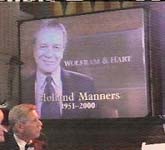 Wolfram
& Hart is the ultimate example of an institution which is
outwardly benign or at least legal, but inwardly malevolent
and dishonest. However in the morally grey world of the city,
Angel is unable to simply fight the firm to the death, and similarly
they can't get rid of him; instead, the relationship is ambiguous,
with Angel working both with and against Lilah and Lindsey and
vice a versa, but with the emphasis on their coexistence. While
Angel might want to destroy Wolfram & Hart, and he tries,
he can't.
Wolfram
& Hart is the ultimate example of an institution which is
outwardly benign or at least legal, but inwardly malevolent
and dishonest. However in the morally grey world of the city,
Angel is unable to simply fight the firm to the death, and similarly
they can't get rid of him; instead, the relationship is ambiguous,
with Angel working both with and against Lilah and Lindsey and
vice a versa, but with the emphasis on their coexistence. While
Angel might want to destroy Wolfram & Hart, and he tries,
he can't.